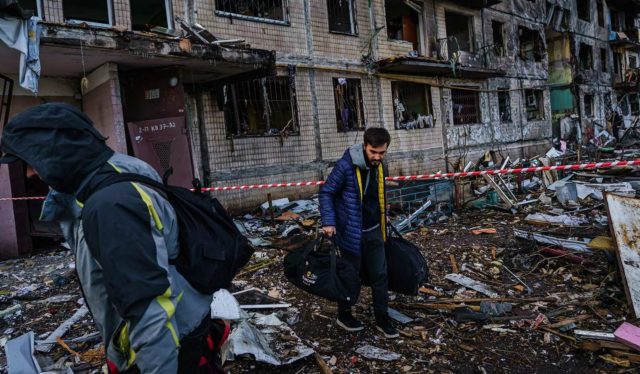
Russian soldier identified by Instagram handle spraypainted at war crime scene Residents carry bags out of an apartment building damaged by a Russian strike in suburban Kyiv, Ukraine on March 14, 2022. (Marcus Yam/Los Angeles Times/TNS)
A Russian soldier who was allegedly involved in executing Ukrainians in Bucha may have revealed his identity by spray-painting his Instagram handle on a wall in the town.
A special report published by Reuters on Thursday details a number of clues investigators have uncovered in efforts to identify the perpetrators of an alleged massacre of civilians by Russian forces occupying the Kyiv area. After Russian troops withdrew from the area around the Ukrainian capital city, the Ukrainian side reported uncovering the bodies of 410 civilians in towns around the city, including 21 in Bucha.
Ukrainian and international investigators have begun gathering evidence in their investigation into what happened in Bucha and Reuters reporters were allowed to see some of the clues they reportedly uncovered.
Bucha resident Vitalii Zhyvotovskyi reportedly told investigators that Russian forces occupied his and other neighboring homes. In one of his neighbor’s houses, someone had spraypainted on a bedroom wall “Wolf_68.”
Reuters identified a Russian man named Kirill Kryuchkov, who uses variations of “Wolf_68” in his social media handles. An Instagram account named @tambov_wolf_68_rus includes multiple videos of what appear to be Russian soldiers in uniform on April 19. In one video, a soldier had a paratrooper patch on his arm and another had a “V” patch, which is a symbol used by Russian invasion forces in Ukraine.
Reuters reported two people who know Kryuchkov reached out to the publication and said he served in the 234th Air Assault Regiment, which is part of the 76th Guards Air Assault Division. One individual said Kryuchkov had been in Ukraine.
Reuters said it contacted another friend of Kryuchkov named Vitaly Shcherbakov, who had posted photos with Kryuchkov where they were wearing paratrooper uniforms. Shcherbakov declined to talk about Kryuchkov, but said: “You can write: ‘Fuck the Ukies.'”
Zhyvotovskyi told Reuters the Russian soldiers that occupied his neighbor’s home were part of the same group of Russians that he said brought hooded captives into his own home. Zhyvotovskyi said at one point he saw four Russian soldiers bring one of the hooded captives out and made him kneel by the back fence of his property. Zhyvotovskyi said he heard the soldiers beat the man.
“I heard sounds of bones being broken. The sounds of a beating,” Zhyvotovskyi told Reuters. “There was screaming, lots of screaming.”
Zhyvotovskyi said he later heard multiple gunshots near where the soldiers had taken the man. “Then there was silence.”
Zhyvotovskyi said he and his family members eventually escaped on March 10. He said he returned to find much of his home burned, but discovered a pile of identity documents of locals. Under the pile of documents, Zhyvotovskyi said he found a hand-written letter addressed to a soldier named Aleksandr Logvinenko, from a woman named Oksana Rybakova.
Rybakova called Logvinenko her “soldier.” In the letter, she wrote, “It’s good you are close, close in my heart, but you are far, serving our Motherland, protecting us. I’m proud of you!” and left a kiss imprint on the letter with her lipstick.
Reuters said it traced Rybakova to the Pskov region of Russia, where the 76th Guards Air Assault Division is based.
Investigators believe the Russian forces that had occupied Bucha had left in a hurry. In their apparent hasty retreat, soldiers appeared to leave other identifying materials. Members of the National Guard of Ukraine helped clear out the building that occupying Russian forces had used as a headquarters. As they were moving boxes of Russian ammunition and gas masks out of the building, they found a Russian identification card belonging to Corporal Konstantin Vladimirovich Korshunov.
Korshunov’s identification card noted that he had completed a telecoms equipment course and listed him as a member of military unit No. 3179. Reuters reported the unit is part of Russia’s Vityaz security force, which reports to Russian National Guard (Rosgvardiya) Director Viktor Zolotov. According to Reuters, Zolotov previously served as Putin’s bodyguard and he allegedly still reports directly to Putin.
The information on the identification card indicated Korshunov is from the Russian city of Penza. Reuters reported it contacted two people from Pezna who know Korshunov. These people confirmed he is in Rosgvardiya and works in unit No. 3179.
After the discovery of slain civilians in the Kyiv area, U.S. President Joe Biden had called Russian President Vladimir Putin a “war criminal” and called for him to face a trial. Ukrainian President Volodymyr Zelenskyy further accused the Russian forces of committing “genocide.”




